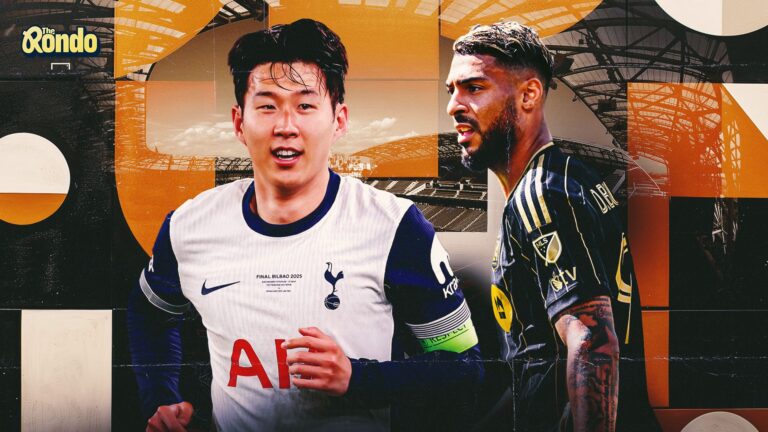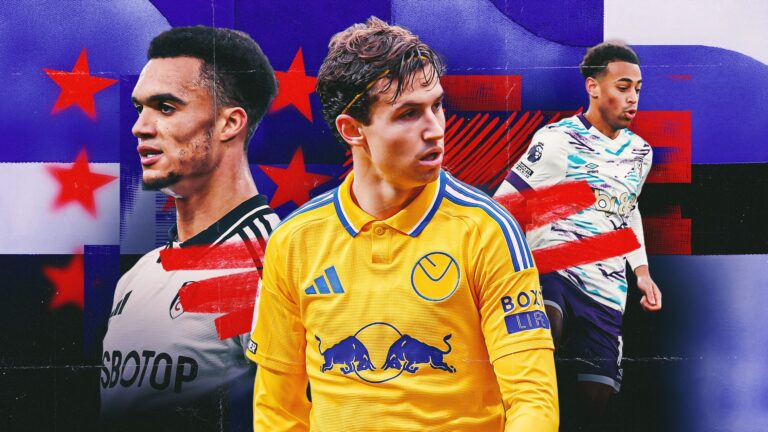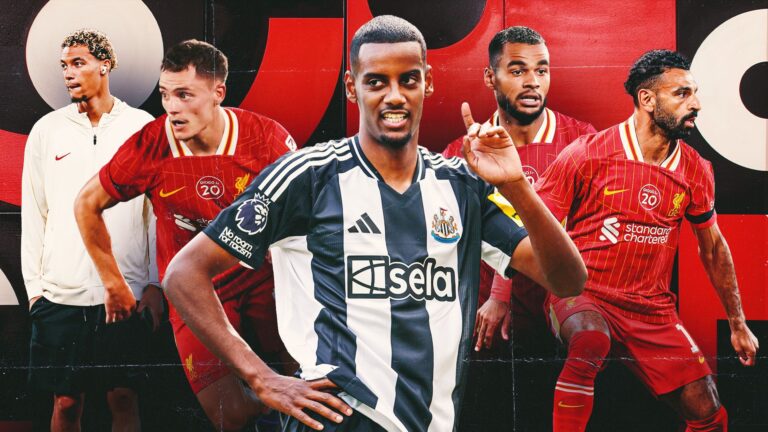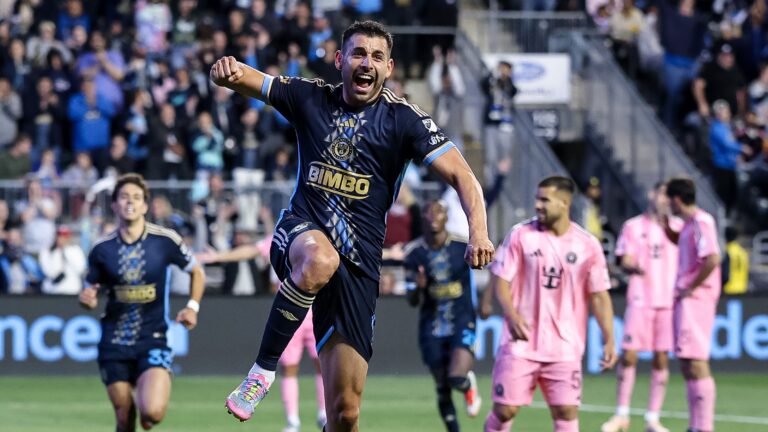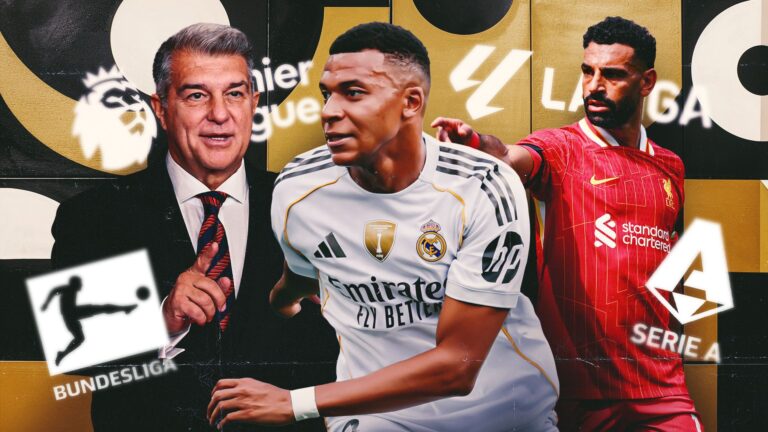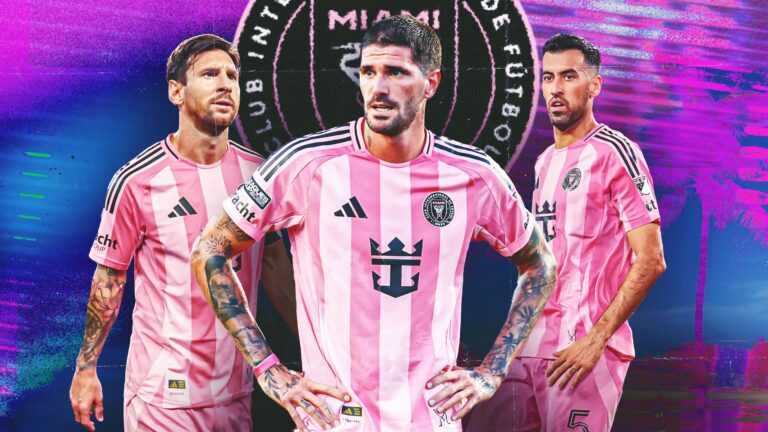Football General Manager
AUSTIN, Texas – Lionel Messi means the world to Jesus Rodriguez.
For the 22-year-old, who has Cerebral Palsy and developmental disabilities, the Argentine star is a light – a beacon of hope in an otherwise challenging life. Whether it’s weaving through multiple defenders or beating goalkeepers with pinpoint precision on free kicks, Messi doesn’t let obstacles stand in his way, and that inspires Rodriguez to keep fighting. So much so that his mother, Tanya Jasso, wanted to find a way for her son to finally see Messi.
She originally tried last season and was ready to take her son, husband, and Jesus’ stepfather, Javier Partida, to see Messi in Columbus, Ohio, for the 2024 MLS All-Star Game. But in the 2024 Copa America Final, Messi injured his ankle. The plan was scrapped. Then, in March, Jasso got the exciting news that the 2025 MLS All-Star would be held in Austin.
For the family who lives in Alamo, New Mexico, the Texas capital was within driving distance. They wanted to give Jesus the experience of a lifetime, saving money and then spending thousands of dollars to get tickets in the VIP section 7, row 3, behind the MLS All-Star bench. Everything was in motion, and when Jesus heard the news, he was brimming with excitement.
Then Wednesday happened.
Messi and Inter Miami teammate Jordi Alba had been no-shows for MLS All-Star training sessions earlier in the week, and on the morning of the All-Star Game, the league confirmed what had increasingly appeared inevitable – neither would play, both removed from the final MLS roster.
Jasso said that she and her family were devastated when they heard the news. Jesus sat motionless with his head drooping toward the concrete sidewalk, and Jasso was furious about the timing and the manner in which both MLS and Messi handled the situation.
“I’m very sad because I did everything I could so my son could come see Messi, especially since he has a disability,” Jasso told BALLGM Wednesday before the All-Star Game. “I feel heartbroken for him. It’s always been his dream to meet Messi, but he’s not going to be here. I made a lot of sacrifices… We drove 10 hours from Alamo, New Mexico, to get here, and we’re very tired.”
Jasso was perplexed as to why MLS waited until the day of the game – at 11:15 a.m. Central Time, to be exact – to reveal that the face of their league would not be playing in its midseason showcase.
“I think they should be more honest and give fans a heads-up so we don’t go through so much for nothing,” she said. “I feel sad because [Messi] should think about his fans – and right now, he’s not. I believe Messi is partly to blame, as is the league, because he should’ve made an effort to be here.”
Jasso wasn’t alone in feeling let down by MLS and its Argentine superstar. Social media was flush with fans who said the league should have done more to hold Messi accountable, and some who cynically suggested the league was aware of Messi’s status ahead of the game intentionally promoted his participation, and withheld the information to build buzz for the game.
Austin’s leading newspaper, The Austin Chronicle ripped Messi and MLS to shreds for the way the situation was handled, with Eric Goodman writing “Messi’s decision not to show up for one night in Austin is a huge middle finger to MLS and its fans.”
Despite the very public angst, MLS Commissioner Don Garber, in his All-Star Game midseason address, declined to confirm whether the players would face discipline, saying only that the league should have been more proactive in determining Messi and Alba’s availability. In several unprompted moments, Garber appeared to gush over Messi’s positive impact on the league – noting his sizable social media presence and the credibility he brings to MLS.
Sports commissioners essentially work for team owners, which means occasionally having to tow the line. But considering the circumstances, Garber’s responses – and in some cases, lack thereof – seemed tone deaf. Failing to be firm and resolute could both set a precedent and have consequences, signaling to MLS fans that their role in All-Star voting effectively doesn’t matter.
On Friday, two days after the All-Star Game, MLS finally announced a decision, suspending both Messi and Alba for Inter Miami’s match against FC Cincinnati on Saturday. Garber praised Messi’s overall contributions, but said the league had to follow its policies.
“The most important thing is I know Leo Messi loves this league, and MLS is an entirely different league because of the years he’s been here helping to show the world what MLS is and what it’s capable of being,” Garber told the Athletic. “Nobody has done more for Major League Soccer than Lionel Messi. Not just what he’s done off the field, but what he’s done on the field. Every game is a must-see match. I fully understand and respect and admire his commitment to Inter Miami.
"His decision is not one that I really can argue with whatsoever and I understand it. But unfortunately we have a longstanding policy relating to player participation in the All-Star Game and we had to enforce that policy. It was a very, very difficult decision, but one I hope both [Messi] and everyone else can understand and respect. He has shown up for his club, for his teammates, for our league time and time again and I respect his decision.”
Garber added that MLS plans to re-evaluate the policy.
“We are going to take a very hard look at the rule moving forward," he said. "It is important to all of our players and all of our fans that we have a policy that reflects and involves the realities of our league and its players going forward. I am committed to working with all of our players and to start working with Leo Messi to adapt this rule so it makes sense going forward.”
Calling MLS rules for sanctioning players who skip its All-Star game "draconian," Inter Miami owner Jorge Mas on Friday said that Messi was "extremely upset’ by the suspension. Mas claimed it was the club’s decision to let both Messi and Alba skip the ASG, keeping their long-term health and fitness in mind amid a congested schedule, and that the players’ were upset by the league’s actions.
"I believe it’s a bad rule, but it’s a rule nonetheless," he said. "And it’s a bad rule because I think it puts the players in an untenable position to have to choose between participating in an All-Star festivity, which is an exhibition match, or choosing a regular-season game that I think matters. And I admire both Lionel and Jordi for always thinking of club first.”
Messi is the first MLS starter in the past 30 years to skip an All-Star game for non-injury reasons – the first being Zlatan Ibrahimovic. In most other major U.S. sports – the NBA, MLB, NHL and NFL, leagues that represent the best of the best in their respective games – it would generally be unthinkable for a player equal to Messi’s stature to skip its marquee match for reasons other than injury.
So how did MLS get to this point with the face of the league?
BALLGM spoke to MLS All-Stars, former executives, and insiders to assess the fallout from Messi’s no-show and what it signals about the league’s present and future.





AUSTIN, Texas – Lionel Messi means the world to Jesus Rodriguez.
For the 22-year-old, who has Cerebral Palsy and developmental disabilities, the Argentine star is a light – a beacon of hope in an otherwise challenging life. Whether it’s weaving through multiple defenders or beating goalkeepers with pinpoint precision on free kicks, Messi doesn’t let obstacles stand in his way, and that inspires Rodriguez to keep fighting. So much so that his mother, Tanya Jasso, wanted to find a way for her son to finally see Messi.
She originally tried last season and was ready to take her son, husband, and Jesus’ stepfather, Javier Partida, to see Messi in Columbus, Ohio, for the 2024 MLS All-Star Game. But in the 2024 Copa America Final, Messi injured his ankle. The plan was scrapped. Then, in March, Jasso got the exciting news that the 2025 MLS All-Star would be held in Austin.
For the family who lives in Alamo, New Mexico, the Texas capital was within driving distance. They wanted to give Jesus the experience of a lifetime, saving money and then spending thousands of dollars to get tickets in the VIP section 7, row 3, behind the MLS All-Star bench. Everything was in motion, and when Jesus heard the news, he was brimming with excitement.
Then Wednesday happened.
Messi and Inter Miami teammate Jordi Alba had been no-shows for MLS All-Star training sessions earlier in the week, and on the morning of the All-Star Game, the league confirmed what had increasingly appeared inevitable – neither would play, both removed from the final MLS roster.
Jasso said that she and her family were devastated when they heard the news. Jesus sat motionless with his head drooping toward the concrete sidewalk, and Jasso was furious about the timing and the manner in which both MLS and Messi handled the situation.
“I’m very sad because I did everything I could so my son could come see Messi, especially since he has a disability,” Jasso told BALLGM Wednesday before the All-Star Game. “I feel heartbroken for him. It’s always been his dream to meet Messi, but he’s not going to be here. I made a lot of sacrifices… We drove 10 hours from Alamo, New Mexico, to get here, and we’re very tired.”
Jasso was perplexed as to why MLS waited until the day of the game – at 11:15 a.m. Central Time, to be exact – to reveal that the face of their league would not be playing in its midseason showcase.
“I think they should be more honest and give fans a heads-up so we don’t go through so much for nothing,” she said. “I feel sad because [Messi] should think about his fans – and right now, he’s not. I believe Messi is partly to blame, as is the league, because he should’ve made an effort to be here.”
Jasso wasn’t alone in feeling let down by MLS and its Argentine superstar. Social media was flush with fans who said the league should have done more to hold Messi accountable, and some who cynically suggested the league was aware of Messi’s status ahead of the game, intentionally promoted his participation, and withheld the information to build buzz for the game.
Austin’s leading newspaper, The Austin Chronicle ripped Messi and MLS to shreds for the way the situation was handled, with Eric Goodman writing, “Messi’s decision not to show up for one night in Austin is a huge middle finger to MLS and its fans.”
Despite the very public angst, MLS Commissioner Don Garber, in his All-Star Game midseason address, declined to confirm whether the players would face discipline, saying only that the league should have been more proactive in determining Messi and Alba’s availability. In several unprompted moments, Garber appeared to gush over Messi’s positive impact on the league – noting his sizable social media presence and the credibility he brings to MLS.
Sports commissioners essentially work for team owners, which means occasionally having to tow the line. But considering the circumstances, Garber’s responses – and in some cases, lack thereof – seemed tone deaf. Failing to be firm and resolute could both set a precedent and have consequences, signaling to MLS fans that their role in All-Star voting effectively doesn’t matter.
On Friday, two days after the All-Star Game, MLS finally announced a decision, suspending both Messi and Alba for Inter Miami’s match against FC Cincinnati on Saturday. Garber praised Messi’s overall contributions, but said the league had to follow its policies.
“The most important thing is I know Leo Messi loves this league, and MLS is an entirely different league because of the years he’s been here helping to show the world what MLS is and what it’s capable of being,” Garber told the Athletic. “Nobody has done more for Major League Soccer than Lionel Messi. Not just what he’s done off the field, but what he’s done on the field. Every game is a must-see match. I fully understand and respect and admire his commitment to Inter Miami.
“His decision is not one that I really can argue with whatsoever and I understand it. But unfortunately we have a longstanding policy relating to player participation in the All-Star Game and we had to enforce that policy. It was a very, very difficult decision, but one I hope both [Messi] and everyone else can understand and respect. He has shown up for his club, for his teammates, for our league time and time again and I respect his decision.”
Garber added that MLS plans to re-evaluate the policy.
“We are going to take a very hard look at the rule moving forward,” he said. “It is important to all of our players and all of our fans that we have a policy that reflects and involves the realities of our league and its players going forward. I am committed to working with all of our players and to start working with Leo Messi to adapt this rule so it makes sense going forward.”
Calling MLS rules for sanctioning players who skip its All-Star game “draconian,” Inter Miami owner Jorge Mas on Friday said that Messi was “extremely upset’ by the suspension. Mas claimed it was the club’s decision to let both Messi and Alba skip the ASG, keeping their long-term health and fitness in mind amid a congested schedule, and that the players’ were upset by the league’s actions.
“I believe it’s a bad rule, but it’s a rule nonetheless,” he said. “And it’s a bad rule because I think it puts the players in an untenable position to have to choose between participating in an All-Star festivity, which is an exhibition match, or choosing a regular-season game that I think matters. And I admire both Lionel and Jordi for always thinking of club first.”
Messi is the first MLS starter in the past 30 years to skip an All-Star game for non-injury reasons – the first being Zlatan Ibrahimovic. In most other major U.S. sports – the NBA, MLB, NHL and NFL, leagues that represent the best of the best in their respective games – it would generally be unthinkable for a player equal to Messi’s stature to skip its marquee match for reasons other than injury.
So how did MLS get to this point with the face of the league?
BALLGM spoke to MLS All-Stars, former executives, and insiders to assess the fallout from Messi’s no-show and what it signals about the league’s present and future.
Messi may be the most famous – and as an eight-time Ballon d’Or winner, the most accomplished – player ever to join Major League Soccer, but the way he’s avoided an active ambassador role for the league stands in stark contrast to the global icon who preceded him: David Beckham.
While Beckham was never as strong a footballer as Messi, he was arguably just as popular in the pre-social media era. From the moment Beckham joined MLS in a star-studded, Hollywood, celebrity-fueled arrival in 2007, he made it clear that his move to MLS was about more than just playing soccer – it was a mission.
“I’m coming there to make a difference,” Beckham said at his introductory LA Galaxy news conference. “I wouldn’t be doing this if I didn’t think I could make a difference.”
Beckham didn’t just show up, he leaned into the responsibility of helping MLS grow – on and off the field. It wasn’t enough to attract 66,237 fans to Giants Stadium, as he did when the Galaxy traveled to face the New York Red Bulls in a 5-4 loss, or to amplify attendance for opposing clubs by more than 40 percent during his first two years in the league.
He was also making media rounds, and serving as a highly visible face of American club soccer. Whether it was appearing on late-night talk shows, doing photo shoots for leading magazines, or surprising fans at sports bars, Beckham treated the league’s promotion as part of the job.
“Of course, being an ambassador of the league, being an ambassador of the game here is obviously important,” he said at an appearance in 2012 at the ESPN Zone, meeting individually with a group of 70.
Two former leading members of the LA Galaxy staff who worked closely with Beckham told BALLGM that visibility was never optional for the England star, with one source saying, “I would say that media exposure and growth of the league was greatly important to Beckham and Ibrahimovic.”
That went far beyond what was written in any contract. Yes, Beckham wasn’t initially as successful on the pitch as Messi – he didn’t make the playoffs until his third year in the league. But as USMNT icon and former Galaxy GM Alexi Lalas summed it up in 2011, Beckham’s arrival was monumental for MLS.
“He brought relevancy and credibility,” Lalas said, “which is something that U.S. soccer – and maybe even more so Major League Soccer – has and continues to crave.”
And Beckham went to extreme lengths to meet obligations. Former teammate Landon Donovan recalled a moment during the 2012 Olympics when Beckham juggled personal and league duties with incredible effort.
“He flew out right after our game – maybe Saturday or Sunday night – to London,” Donovan said in reaction to the news that Messi had skipped Wednesday’s All-Star Game. “He had to do preparations for the opening ceremonies, then got back on a plane, flew to wherever the All-Star Game was, played the game on Wednesday, and flew back to London that night.”
The irony is striking, considering Beckham is now a co-owner of Inter Miami. Messi, Beckham’s hand-picked superstar and so-called “gift” to elevate MLS into a new era, chose not to show up for the league’s marquee summer event.
And while Messi’s global reach and on-field brilliance are unquestionable, his absence in Austin has pointed to what has become increasingly telegraphed over the past few months: There is a different set of rules for Messi.
This wasn’t the first time Messi’s unique status bent the norms at MLS. There’s no denying Messi’s impact for Inter Miami. Since arriving in 2023, he’s tallied 64 goal contributions in 43 league matches (39 goals, 25 assists), led the Herons to the 2024 Supporters’ Shield with a record 74 points, and won league MVP.
He’s also played the role of recruiter, helping bring former star teammates and friends Luis Suarez, Sergio Busquets, and Jordi Alba to MLS – and it appears Argentina midfielder Rodrigo De Paul will be next.
Off the field, Messi has transformed the club’s profile. Inter Miami’s valuation exploded from $585 million to more than $1.2 billion since his arrival. Attendance, too, has soared, nearly doubling from an average of 12,613 fans per game in 2022 to 21,245 in 2024 – second-best in MLS.
But has Messi had the same impact on the league overall? He’s a guaranteed box office draw, selling out nearly every road match and helping teams such as Sporting KC move games to larger venues to capitalize on the draw and maximize attendance.
Yet beyond the gate, the returns are mixed.
MLS viewership, by most accounts, remains modest. Garber said this week that MLS games streaming on Apple TV average 120,000 unique viewers each, with about one million unique viewers tuning in across all matches on Saturdays. During Beckham’s first two years in the league, MLS averaged 241,000 viewers for games and had a single-match high of 650,000. Of course, in Beckham’s era, matches were broadcast on traditional cable TV, which has greatly declined over the past decade. Today, MLS’s matches are largely streamed via Apple TV.
And Messi’s voice, publicly, has been largely absent. Unlike past MLS stars such as Beckham, Thierry Henry, Zlatan Ibrahimovic, Wayne Rooney, or Kaka, Messi has limited his media opportunities, outside of his introductory news conference.
Yes, he’s done a smattering of one-on-one interviews, but they have generally been well-coordinated and structured – often lacking any real emotion. American sports fans are used to seeing passion. Due to the controlled nature of Messi’s limited interviews, fans have little insight into his thoughts on MLS, the competition level, or even life in the U.S. That might be normal for athletes in Europe, but in North America – where megastars such as LeBron James and Patrick Mahomes regularly speak to the media – it’s a missed opportunity.
Historically, MLS has fined players who skip media duties. Henry often grumbled about the requirement but still fulfilled it. Ibrahimovic stirred headlines with brash, unfiltered takes that MLS likely didn’t always appreciate. Messi, by contrast, appears to operate under different rules.
The Athletic reported that Messi struck a handshake deal to avoid regular media obligations. Some within MLS circles have contrasted Messi’s silence outside of a handful of preselected opportunities to Cristiano Ronaldo’s outspoken promotion of the Saudi Pro League.
The question, ultimately, is how much impact Messi as a “brand” has lifted the league? MLS is now home to more of the highest valued soccer franchises than any other league in global soccer, according to Sportico’s annual rankings. North America’s top flight has 19 of the top 50, and five of the top 20, eclipsing every other top division in world football.
The league’s average valuation is $700 million, with LAFC and Inter Miami – Messi’s club – sitting at the top, both valued north of $1.2B.
“There’s no doubt that there’s a before and after Lionel Messi in this league,” Mas said. “Lionel Messi, he is different. He has completely changed the economics of this league, for every single club, every team, every sponsor, the league, media, etc… Lionel Messi has created, for the first time in the league history, $10 million gates where he goes. Clubs change stadiums so Lionel Messi can perform and play, and Inter Miami can play. And that’s an amazing asset and an amazing thing for the league.”
What started as a question Monday became seemingly inevitable by Tuesday afternoon: Messi might skip All-Star week entirely. The league has generally accepted the “Messi rules” – flexibility in exchange for brilliance on the pitch. But this was uncharted territory, even by North American standards.
All-Star events, while rarely competitive, are marketing engines built on fan participation. They’re celebrations of a sport and a league, and there is generally a kind of unspoken pact with fans. You vote, they show up.
The tradition runs deep. Babe Ruth was an All-Star. Michael Jordan was an All-Star. Even when selections spark debate, that debate fuels connection. Fans can’t control lineups or referee decisions – but All-Star votes are theirs.
No story captures this better than John Scott’s in 2016. A journeyman NHL enforcer with just five career goals, Scott was voted by fans into the league’s All-Star game. The league reportedly tried to block him – even demoting him to the minors after a trade – but he played anyway, scored twice, and was named MVP. That’s the magic of sports: unpredictability and presence.
For the 28 MLS All-Stars who did show up in Austin, that mattered.
“When you have eyes on you, and to be able to have a voice and showcase yourself … it’s very important,” said U.S. international Diego Luna. “MLS is in a big year leading up to the World Cup – this brings more focus and attention.”
Chucky Lozano and Cristian Espinoza echoed that sentiment. Garber, meanwhile, downplayed Messi’s absence, citing Inter Miami’s packed schedule and Club World Cup obligations.
“Miami has had a schedule that is unlike any other team,” Garber said. “Most of our teams had a 10-day break. Miami hasn’t. We had Leo playing 90 minutes in almost all the games that he’s played.”
But the numbers tell a more nuanced story. Inter Miami and LAFC each played 16 matches between the league and Club World Cup; Seattle played just one fewer. And of those three, Miami actually had the longest break – 14 days – between league play and the Club World Cup.
Now that the league has enforced its rules, suspending the two Miami players, the question remains: How can this be avoided next time?
It starts with expectation and accountability. Did MLS and Miami adequately outline expectations for Messi when he arrived in the league, including responsibilities at tentpole events such as the All-Star game? Media responsibilities aren’t as critical as they were in the Beckham era, but skipping an MLS All-Star game both damages trust and could set a precedent for other stars in the league.
Zlatan skipped an All-Star game. Now Messi has done the same. How can MLS discourage repeat offenses? How does the league impart the value of its marquee game to its top stars, especially those who have previously played in Europe, where All-Star games are literally foreign concepts?
Does the league need harsher penalties? Neither Messi or Alba are likely to lose sleep because they didn’t have a chance to play with Brad Stuver or Sam Surridge in the ASG – no offense to either – or the fact they must sit out one match, even if it’s against a contending Cincinnati side. Or as Garber suggested Friday – the league “working with Leo Messi to adapt this rule” – could MLS go the opposite direction, and forego future sanctions, thus potentially risking more players skipping out?
One suggestion that has gained traction within league circles is changing the scheduling for the ASG, or even canceling it in years in which there are other major tournaments, such as the Club World Cup or the World Cup. One insider suggested MLS follow the NHL’s lead and postpone All-Star the way the NHL did during the Olympics.
While Garber has already gone on record that he wants the 2026 Charlotte All-Star Game to be the best ever, riding momentum from the World Cup, the league might be better served by pressing pause.
“What I think is that if they want to do this type of event, it’s great to do it, and the truth is that it’s great for the league. There shouldn’t be a date in the schedule. It’s crazy,” Miami coach Javier Mascherano said Friday before the league announced the suspensions. “We’ve been playing four of the last five games away. We’ve been playing four away. We’ve been playing practically every three days.”
While a one-game suspension might seem like a slap on the wrist, Garber and MLS aren’t helped by Messi’s uncertain future in the league, a situation Donovan outlined.
“From the League’s perspective, this is really frustrating because you have your best player, your partners want him there, the owners want him there, the sponsors want him there, the fans want him there, the other guys on the MLS All-Star team want the chance to play with Messi – that’s a dream for them,” Donovan said. “So this becomes a really challenging situation, and from the league standpoint now, what do you do? … Inter Miami and the league are trying to renegotiate, so that he stays here – his contract is up at the end of the season.”
Messi’s contract with Inter Miami comes to an end in December 2025, meaning the team and league have less than five months to extend the face of the league. Messi’s impact on MLS is undeniable – record crowds, global attention, Apple TV subscribers, he checks all those boxes.
But, make no mistake, Garber and MLS need to find answers to all of this soon. It can’t risk fan trust all for the sake of revenue or reputational gains. Or fans will look elsewhere. As the Jasso and Partida family noted.
“Hey, we might have better luck seeing [Messi] at the World Cup,” Partida quipped.
Moments like what happened – or didn’t happen – in Austin this week remind us that the league’s future won’t be built on star power alone.
It’ll be built on trust. On showing up.


